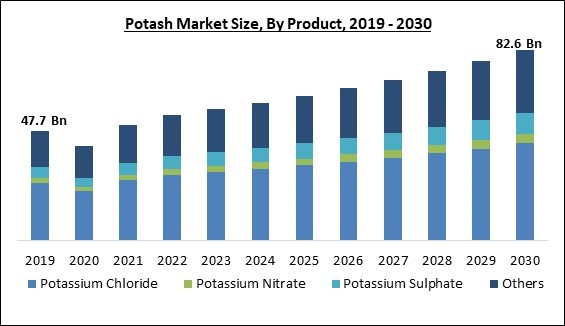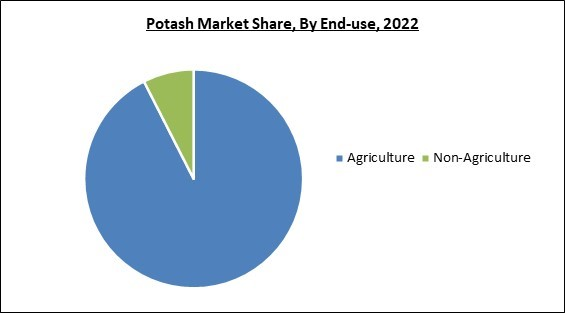The United States and Canada are primarily responsible for the increase in market demand in the North American region. Consequently, the North America Region acquired $11.9 billion revenue in the market in 2022. The agricultural sectors in these nations are sizable and support a wide variety of crops. The region's demand mostly depends on producing essential crops, including soybeans, corn, wheat, and canola. The need for potash in North America is further made more pressing by adopting cutting-edge farming methods and precision agriculture techniques. Some of the factors impacting the market are growing need to boost food production, increased adoption of precision farming, and high cost of SOP.
Due to changes in people's eating patterns, the demand for food has increased faster than the population. This has caused the need for pesticides and fertilizer to increase. These herbicides and fertilizers increase crop yield, soil fertility, and output. As a result, it is anticipated that demand for potassium chloride will rise in lockstep with the expansion of the agricultural sector. Additionally, there is an overall improvement in plant quality due to the rising demand for high-performance fertilizers, increasing potash fertilizer applicability, and adding potash fertilizer. It extends shelf life, another vital fueling the market's expansion. Growing environmental awareness will encourage market value expansion even further. Global warming has had a significant impact on climatic conditions around the world. Additionally, an essential factor that significantly influences agriculture is the climate. With the aid of precision agricultural tools, farmers can efficiently and adequately apply potash, guaranteeing crops receive the proper nutrients while lowering the possibility of environmental impact. Farmers can maximize their potash usage by using precision agriculture, which improves crop yields and has a smaller negative ecological impact. Given this, the market is predicted to expand in the coming years due to the increased use of precision farming.
However, Due to their intricate manufacturing requirements, SOP fertilizers are pricey. One of the popular techniques used to produce SOPs is the Mannheim process. Because of the high cost of this process, SOP is more expensive. Because the hydrochloric acid produced as a byproduct of this process cannot be sold, the manufacturers who employ it are forced to recoup their manufacturing costs through the sales of SOP. Due to this, SOP usually costs more than $150 per ton compared to potassium chloride. Because of this, the high cost of SOP manufacturing may hinder market expansion of the market throughout the projection period.
End-user Outlook
On the basis of end-use, the market is fragmented into agriculture and non-agriculture. In 2022, the agriculture segment witnessed the largest revenue share in the market. This expansion is credited to the agricultural sector's capacity to boost crop growth, maximize yields, and guarantee food security worldwide. This vital nutrient supports crop health by promoting root formation, plant growth, and plant growth. Due to its increasing importance in fertilizer mixes used to increase agricultural output in response to increased demand, potash has come to be regarded as a crucial component of current farming techniques. Farmers constantly attempt to boost agricultural production in response to the expanding global population and the resulting rise in food consumption, which results in a persistent and significant need for potash-based fertilizers.Product Outlook
Based on product, the market is segmented into potassium chloride, potassium sulfate, potassium nitrate, and others. Two crucial nutrients, potassium and nitrate, are found in potassium nitrate, a soluble form of both. It is used as a fertilizer for various crops, including fruits, vegetables, and flowers. Potassium nitrate has advantages, especially when a highly soluble, chloride-free nutrient source is needed. There is no need for additional soil transformation or microbial activity in these soils because all of the nitrogen is immediately available for uptake by the plant as nitrate. Farmers occasionally choose nitrate-based nutritional supplies while cultivating high-value/non-traditional crops and vegetables to boost quality and output.Regional Outlook
Region-wise, the market is analyzed across North America, Europe, Asia Pacific, and LAMEA. In 2022, the Asia Pacific region dominated the market by generating the maximum revenue share. This is mainly attributed to increased product demand in developed nations like China and India. These nations' huge agricultural industries, which serve their sizable populations, call for a significant increase in food production. The development of crops like wheat, rice, corn, and vegetables is chiefly responsible for China's demand for potash. Additionally, crops, including wheat, rice, sugarcane, and cotton, are the primary agricultural focus in India. The Asia Pacific region experiences high product demand, primarily driven by several factors, including the region's expanding population, increasing urbanization, and ongoing movement toward sustainable agriculture.The market research report covers the analysis of key stakeholders of the market. Key companies profiled in the report include The Mosaic Company, Rio Tinto PLC, Compass Minerals International, Inc., Nutrien Limited, western nutrients corporation, Yara International ASA, BHP Group Limited, Encanto Potash Corp., Red Metal Ltd., and Intrepid Potash Inc.
Strategies Deployed in the Market
- Jul-2022: Nutrien Limited announced the acquisition of Casa do Adubo S.A., a family-founded Casa do Adubo started in 1937 as Irmãos Chiabai, trading goods in Afonso Cláudio, ES. Through this acquisition, Nutrien would take over 10 Agrodistribuidor Casal distribution centres and 39 retail outlets under the brands Casa do Adubo and Acre, Bahia, Esprito Santo, Maranho, Mato Grosso, etc.
- May-2022: Rio Tinto PLC announced collaboration with BHP, a company providing resources for a cleaner future, including copper for renewable energy. Through this collaboration, both the companies hope to take advantage of the excellent inventions and ideas. Moreover, both want to identify methods to make tailings facilities safer and more environmentally friendly.
- Mar-2021: The Mosaic Company entered a partnership with Sound Agriculture. This partnership aimed to bring a revolutionary nutrient efficiency product to market to accelerate yields across major row crops and improve soil health. The companies would team up on the development and distribution of a proprietary mix of Sound Agriculture's bio-inspired chemistry and key micronutrients.
- Mar-2021: The Mosaic Company came into collaboration with AgBiome, a biotechnology company. This collaboration aimed to develop, discover, and introduce biological alternatives to boost soil fertility. In addition, Mosaic and AgBiome would support the development of advanced agricultural technologies, which facilitate farmers to boost nutrient usage efficiency and ultimately decrease fertilizer loss to the environment.
- Apr-2020: Nutrien entered into a definitive agreement to purchase 100 percent of the equity of the Tec Agro Group. This acquisition would support the company's strategy to bring whole-farm solutions to the Brazilian customers.
- Apr-2019: Nutrien took over Ruralco Holdings Limited in Australia. Through this acquisition, the combination of Ruralco’s business with Nutrien’s Landmark operations would offer significant advantages for all stakeholders and boost the delivery of products and services to Australian farmers. The combination would also offer Australian growers with advanced solutions offerings to allow them to better compete in global markets.
Scope of the Study
Market Segments Covered in the Report:
By Product(Volume, Kilo Tonnes, USD Million, 2019-2030)
- Potassium Chloride
- Potassium Nitrate
- Potassium Sulphate
- Others
By End-user(Volume, Kilo Tonnes, USD Million, 2019-2030)
- Agriculture
- Non-Agriculture
By Geography(Volume, Kilo Tonnes, USD Million, 2019-2030)
- North America
- US
- Mexico
- Canada
- Rest of North America
- Europe
- Russia
- France
- Germany
- UK
- Spain
- Italy
- Rest of Europe
- Asia Pacific
- China
- India
- Thailand
- Japan
- South Korea
- Australia
- Rest of Asia Pacific
- LAMEA
- Brazil
- Argentina
- South Africa
- Nigeria
- Morocco
- Chile
- Rest of LAMEA
Key Market Players
List of Companies Profiled in the Report:
- The Mosaic Company
- Rio Tinto PLC
- Compass Minerals International, Inc.
- Nutrien Limited
- Western nutrients corporation
- Yara International ASA
- BHP Group Limited
- Encanto Potash Corp.
- Red Metal Ltd.
- Intrepid Potash Inc.
Unique Offerings
- Exhaustive coverage
- The highest number of Market tables and figures
- Subscription-based model available
- Guaranteed best price
- Assured post sales research support with 10% customization free
Table of Contents
Companies Mentioned
- The Mosaic Company
- Rio Tinto PLC
- Compass Minerals International, Inc.
- Nutrien Limited
- Western nutrients corporation
- Yara International ASA
- BHP Group Limited
- Encanto Potash Corp.
- Red Metal Ltd.
- Intrepid Potash Inc.










